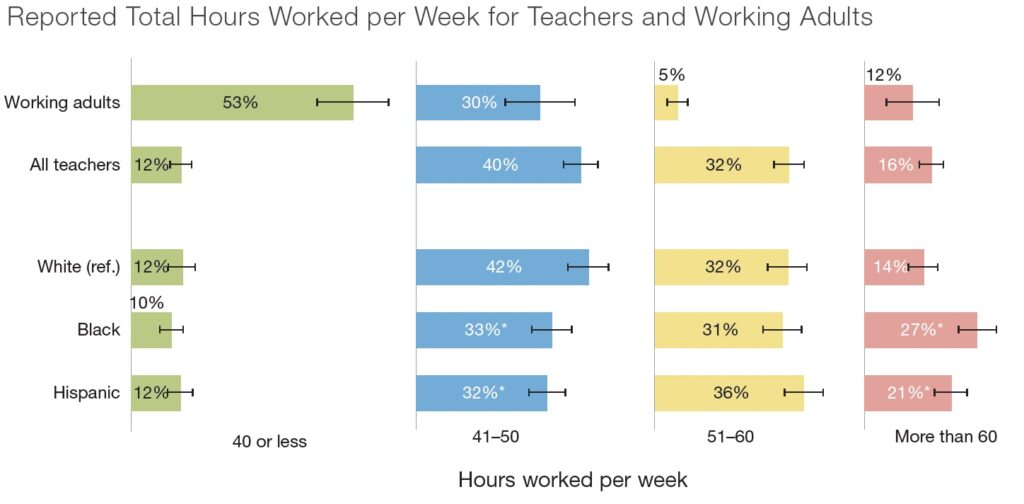Teachers often say that getting into education was never about the pay, but they probably would not say the same about adequate pay. What they are saying, a new survey finds, is that a $17,000 raise is needed to make them feel they are fairly compensated compared to other working professionals.
Two-thirds of teachers feel their base salary is inadequate, compared to 39% of working Americans who say the same, according to data from the 2023 State of the American Teacher Survey released Tuesday by the RAND Corporation, a public policy research organization. A $17,000 raise would equal an average 27% increase, which would cover the pay gap between teachers and similarly college-educated professionals, RAND found.
“Most teachers feel overworked and underpaid, but we didn’t know what teachers considered to be fair pay or how the amount of their desired pay is related to the cost of living and the working conditions in their schools,” said Elizabeth D. Steiner, lead author of the report and a policy researcher at RAND, a nonprofit, nonpartisan research organization. “Teachers at all levels of experience desired higher pay, suggesting the importance of raising pay across the salary schedule.”
More from DA: 3 superintendents depart, a history-making hire and more relocations
The survey sought to understand how salary and work hours might be leading teachers to leave their jobs and the impacts on well-being. RAND’s researchers also polled other working adults to provide a comparison to teachers’ concerns.
Teachers worked an average of 53 hours per week during the school year compared to the 46 hours worked by other professionals. Perhaps even more concerning for K12 leaders is that teachers said they were not contracted and compensated for one out of every four each week.
Another finding that should trouble superintendents and their teams is that Black teachers reported working more hours per week, receiving slightly lower pay, and being less satisfied with their base salaries. RAND’s researchers warn that this could drive more Black educators out of the profession, undoing recent gains districts have made in diversifying their teaching staffs.

In fact, Black teachers’ made about $4,700 less in base salary than non-black teachers, with the gap driven by the cost of living and teaching experience, RAND noted.
“The survey shows that pay, hours worked, and working conditions are interrelated, suggesting that pay increases alone—without improvements in teachers’ working hours or conditions—are unlikely to bring about large shifts in teachers’ well-being or their intentions to leave the profession,” said Ashley Woo, coauthor and an assistant policy researcher at RAND.
Nearly half of the nation’s governors have said raising teacher pay is a priority in 2023. Among the proposals are small percentage point increases in salary, bonuses and higher minimum salaries. RAND notes, however, that some of these states have also suggested eliminating salary schedules that pay higher wages to teachers with more experience and expanding school voucher programs.
Here are some more key findings about teachers’ job satisfaction that should give superintendents a clearer picture of staff morale:
- Teachers who were dissatisfied with their base salary earned $11,000 less than teachers who were satisfied.
- Teachers worked 15 uncontracted hours per week, on average
- Teachers’ desired salaries, among those who indicated that their base pay was inadequate, were linked to the cost of living.
Will a $17,000 raise solve the problem?
When it comes to increasing pay, RAND’s researchers urged superintendents and their teams to use the cost of living as a guide to increasing the salaries of starting teachers. Administrators should also give teachers more opportunities to earn supplemental pay for participating in school-related activities outside their classrooms.
As for working conditions—which are seen as an equally crucial factor in recruitment and retention—district leaders should prioritize reducing the number of hours teachers work each week. Teachers should get more time during the day for preparation and grading, two tasks that are often completed outside of contracting working hours. This could be achieved by reducing course loads and hiring staff to cover teachers’ administrative duties, RAND suggests.
Finally, schools should consider hiring more counselors so teachers can spend less time providing social, emotional, and behavioral support to students outside regular classroom hours, RAND concludes.



